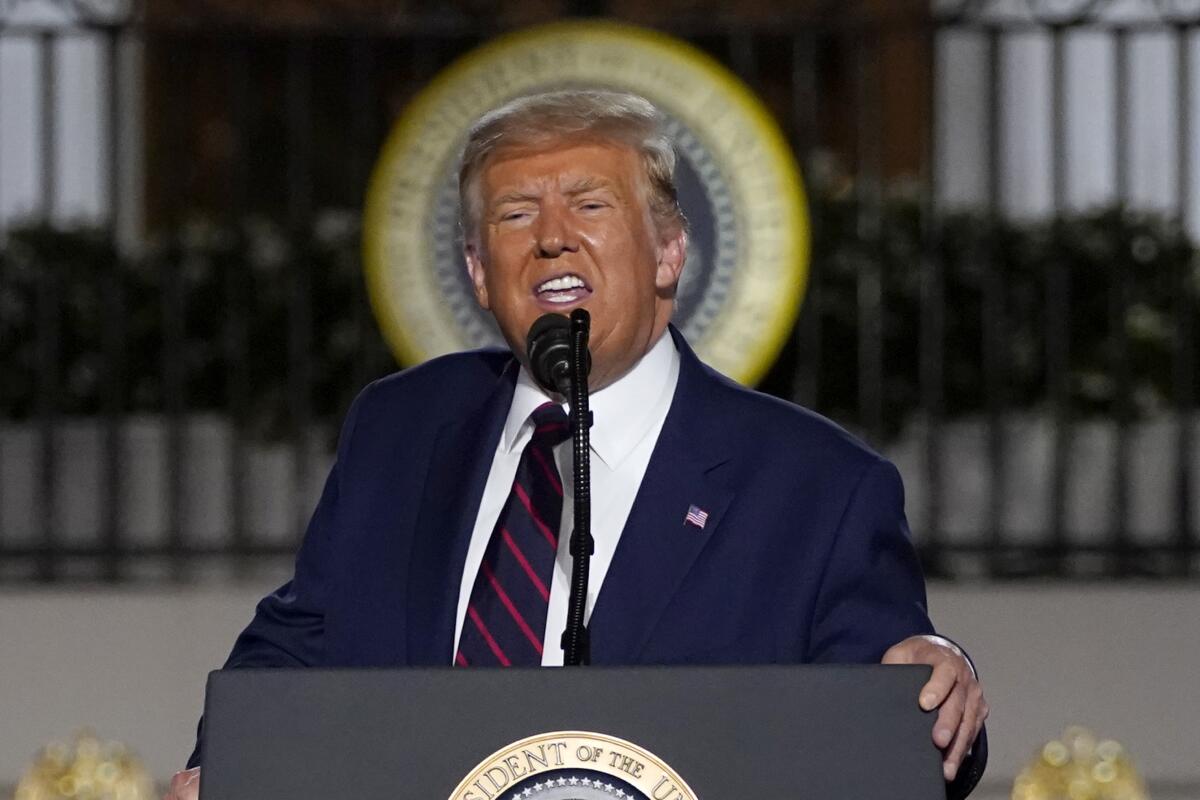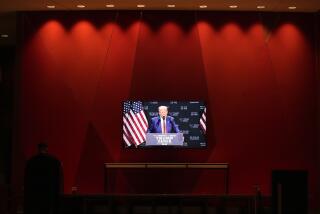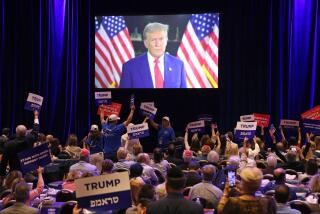Editorial: Trump promises more of the same in a second term — and that’s frightening

In accepting the Republican nomination for a second term as president, Donald Trump sounded lofty themes of national unity and love for country while also offering a glowing and highly exaggerated account of his stewardship. He claimed, for example, that he had done more for African Americans than any president since Abraham Lincoln and promised to produce a coronavirus vaccine “before the end of the year or maybe even sooner.”
He also made characteristically reckless attacks on his Democratic opponent, suggesting that the election of Joe Biden would threaten the American way of life. “Despite all of our greatness as a nation, everything we have achieved is now endangered,” Trump ominously warned. “This election will decide whether we save the American dream, or whether we allow a socialist agenda to demolish our cherished destiny.... Your vote will decide whether we protect law-abiding Americans, or whether we give free rein to violent anarchists, agitators and criminals who threaten our citizens.”
His broadside against Biden was a reminder of how this president has trafficked in demagoguery and distortion throughout his time in office. It also undermined attempts by his party during its virtual convention to project a more optimistic and inclusive message that might peel away enough voters to secure the president’s reelection.
That sort of fear-mongering was a central theme of Trump’s speech Thursday, and it echoed a recurring convention motif that a Democratic victory in November would bring about a dystopian nightmare of socialism, unchecked rioting and liberal thought police. The protests sparked by the deaths of George Floyd and other Black Americans at the hands of police were another recurring theme — not because of the issues they raised, but because of the violence they have at times unleashed. For Trump and his allies, the issue isn’t just law and order, it’s the fear of a cultural reckoning.
The convention’s culture warriors included Mark and Patricia McCloskey, a white couple from St. Louis who pointed firearms at protesters marching past their home and face charges of felony unlawful use of a weapon. Echoing Trump’s racially freighted rhetoric, Patricia McCloskey warned on Monday that Democrats would “bring crime, lawlessness and low-quality apartments into thriving suburban neighborhoods.” She added: “No matter where you live, your family will not be safe in the radical Democrats’ America.”
The speakers’ hyperbolic warnings occasionally bore some relationship to actual events. Some cities are, in fact, riven by violent protests. But the proceedings often felt like a festival of falsehoods and exaggerations — not just about Democratic nominee Joe Biden, but also about the president’s character and record. The speakers largely ignored the ongoing COVID-19 pandemic (no masks in sight!), the millions of jobless Americans and Trump’s lack of a second-term agenda; instead, they sought to distract from his abrasive, blame-shifting and often inept leadership by declaring him a strong president who cares deeply about all Americans and who can single-handedly restore the economy to record-setting heights.
That reality-challenged rhetoric reflected the personality cult that is the Trump presidency as well as today’s GOP. The party didn’t even bother to adopt a new platform, which would have required getting Republican leaders across the country to agree on principles and a plan for the next four years. Instead, it referred voters to its 2016 version while saying that it “will continue to enthusiastically support the president’s America first agenda.”
The convention also reflected Trump’s proclivity for blurring the distinction between his political interests and those of the nation, a blind spot that led to his impeachment after he attempted to have Ukraine, a nation desperately dependent on aid from the United States, to investigate Biden. It wasn’t just that Trump used the White House as a backdrop for his acceptance speech. A naturalization ceremony for new citizens was woven into the convention’s partisan programming, and Secretary of State Michael R. Pompeo addressed the convention from Jerusalem, despite the tradition that the nation’s top diplomat should abstain from partisan political activities.
Yet the GOP also tried to project a more optimistic and inclusive message, one that might induce a requisite number of voters — including suburban women troubled by Trump’s callousness and casual bigotry — to vote for the president without too many pangs of conscience. Numerous speakers of color were featured over the four days, along with multiple individuals testifying to Trump’s concern for them as small-business people or individuals forgotten by Washington. First Lady Melania Trump acknowledged the hardships suffered by many Americans this year and reminded the audience that “we are all one community, comprised of many races, religions and ethnicities.”
It’s doubtful how successful these kinder, gentler themes would have been in obscuring Trump’s actual record of demagoguery, dishonesty and divisiveness. But the president’s unfair attacks on his opponent made it clear what another Trump term would be like: More of the same, in terms of both belligerent policy and caustic bluster. He is what he is.
More to Read
A cure for the common opinion
Get thought-provoking perspectives with our weekly newsletter.
You may occasionally receive promotional content from the Los Angeles Times.










